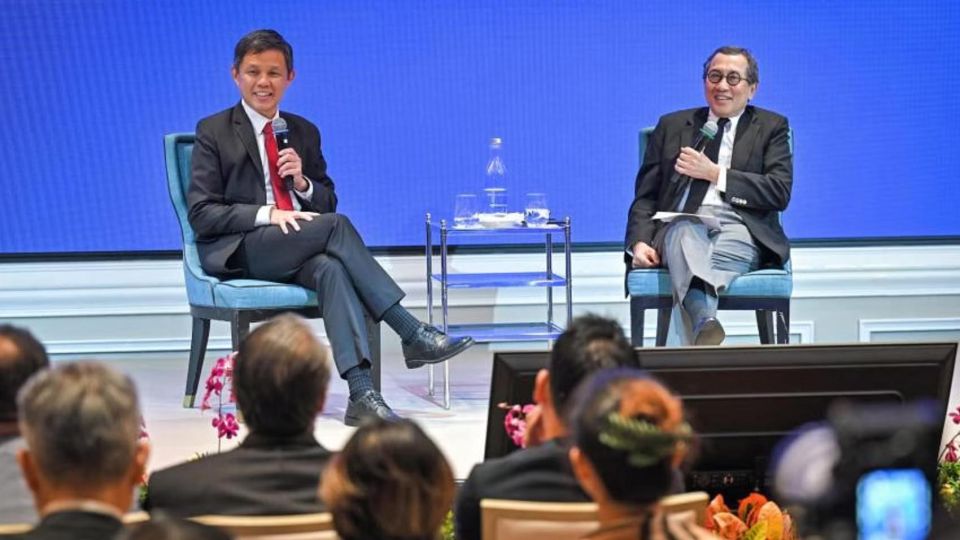June 26, 2024
SINGAPORE – Defining the success of an education system goes beyond looking at rankings, said Education Minister Chan Chun Sing on June 25.
Such success should instead be defined by individuals’ desire for continuous learning, and whether society can tap diverse strengths to build resilience, he added.
“Many rankings have ranked our education system very highly, and I’m very proud of our accomplishments,” Mr Chan said, but it is not just things that are measurable that are important.
He added that all metrics should be taken “with a pinch of salt”.
Mr Chan was responding to a question from former diplomat Bilahari Kausikan, who is the chairman of the National University of Singapore’s Middle East Institute, on the Republic’s performance in a global test of creative thinking that was reported recently.
Singapore’s 15-year-olds had ranked first out of 64 education systems in the test, which was part of the Programme for International Student Assessment (Pisa) 2022, conducted by the Organisation for Economic Cooperation and Development.
Mr Kausikan was moderating the closing session of the Middle East Institute’s annual conference with Mr Chan.
The definition of creativity looks different when applied to various contexts, Mr Chan said, and is but one dimension of achievements.
“Creativity is not just about waking up with the lightbulb coming on,” he said. “Creativity is a disciplined pursuit or disciplined inquiry into issues, problems, and trying to find new and innovative solutions that add value.”
It requires a deep understanding of the surrounding context – cultures, systems, fears and aspirations – along with the ability to create new value propositions, said Mr Chan.
He added that he is not fixated on how people define creativity – whether it is the creativity associated with art and breakthrough inventions, or creativity measured by the Pisa creative test, involving everyday problem-solving at home or work.
Instead, he is “more interested in whether our people have that gumption for disciplined pursuit of ways to overcome challenges”.
Creativity was one of multiple topics covered by Mr Chan and Mr Kausikan during their closing session, which came after three panel discussions on Gulf education systems and changes necessary to address challenges like unemployment. Held both in person at Orchard Hotel and online, the conference had about 170 attendees in its 10th edition. The first conference was held in 2015.
Mr Chan also spoke about changing the public perception of vocational training, in response to a question by Mr Kausikan about how the preference towards academic studies that exists in many systems globally can be overcome.
It is not about the bias, but whether economic value can be derived from a new skill set obtained, said Mr Chan, adding that this is a practical concern that many individuals have.
“People resort to degrees, diplomas, as a signal of their ability and skills,” he said. “But today, many enlightened companies look at their employees not based on their credentials, but based on their skill sets.”
Close partnerships with companies are key to give people confidence that there is an end goal in obtaining a new skill set, he added.
Mr Chan also noted a need to change the mindset of Singaporeans regarding vocational training.
He gave the example of how the Institute of Technical Education had intentionally upgraded its campus into a well-furnished one with good facilities, to foster respect for its students and help them feel a sense of self-respect.
“There is no one single way to overcome this bias against vocational training,” he said. “But there are very practical things that we can do in terms of shaping the environment and culture of how people who go into vocational training are treated and respected.”
He also talked about maintaining a quality teaching force, using technology for personalised learning, and how Singapore’s education system had developed over the years.
Members of the audience asked Mr Chan questions about social mobility and inequality in Singapore, challenges faced by civil servants without scholarships, and the value of education in navigating diversity and conflict.
In response to a question about the Singapore education system’s impact on the country’s regional standing in South-east Asia and whether more could be done to help other Asean nations develop their education systems, Mr Chan said: “I am not in the school of thought that I think Singapore should go around and teach other people.”
He said: “Every society has their own needs and their own context. We don’t just pick and choose certain ideas.”
Singapore’s education system is also not perfect, and even with the rankings it has attained, Mr Chan said he will continue to push for students to be exposed to different perspectives in a global context.
“If every Singaporean student that goes overseas brings back one fresh perspective and new insight from where they have been, we will be much better,” he said.

